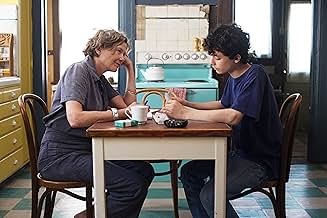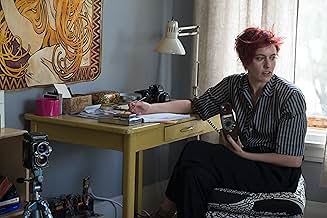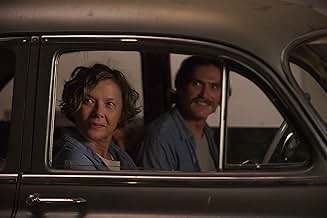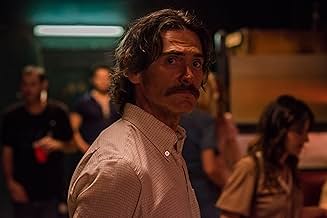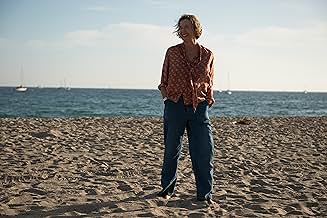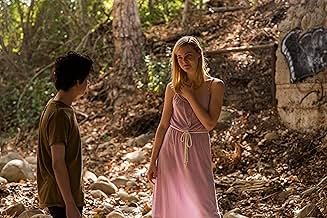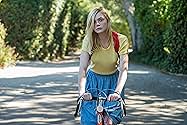IMDb-BEWERTUNG
7,3/10
51.433
IHRE BEWERTUNG
Die Geschichte von drei Frauen, die im Südkalifornien der späten 1970er-Jahre Liebe und Freiheit erkunden.Die Geschichte von drei Frauen, die im Südkalifornien der späten 1970er-Jahre Liebe und Freiheit erkunden.Die Geschichte von drei Frauen, die im Südkalifornien der späten 1970er-Jahre Liebe und Freiheit erkunden.
- Für 1 Oscar nominiert
- 15 Gewinne & 82 Nominierungen insgesamt
Vitaly Andrew LeBeau
- Young Jamie Fields
- (as Vitaly A. Lebeau)
Empfohlene Bewertungen
20th Century Women isn't about giving us some epic look at a group of friends or a family, but it is about the passage of time with people who are warm and caring and in a genuine way. Mike Mills isn't a saccharine filmmaker, but he also doesn't shy away from sentiment - I always have to point out this is separate from sentimentality - and the feeling that I came away with from the comedy 20th Century Women is this warmth from all of the characters, and this feeling that I know these people, whether I did or didn't (and I actually did in the sense that, at times, the mother and son were me and my mom for a short period of my teenage years, so there's an authenticity just there to me).
There's so much empathy for everyone here that it adds to the authenticity of the emotions, even for Greta Gerwig's Abbie who is, in essence, another 'Greta Gerwig' character like I've seen, or think I've seen, in other movies (her quirky wisdom seems akin to last year's Mistress America at least). While she is my least favorite person in this movie, she's given a history and many moments, surrounding one of those terrible things that happens to people and there's not much to be done about it, or could've, it's out of the hands of anything *to* be done. There's so much work done on the characters here by Mills, getting us to like them despite all of their flaws or those moments where they don't act with logic or sense, that it doesn't matter that there isn't too much of a story. This is the story of these characters in a short span of time while also, as if looking on from some other, ethereal plane, about what this time meant in the context of what came before 1979, and what was to come.
Among the actors here, Lucas Jade Zumann is the breakout star as the 15 year old Jamie, but I was so taken with Benning and Fanning as the 50-ish, "she was in the depression" as she's described mother and the 2 years older than Jamie but that matters so much pleutonic friend respectively. I wonder if the film would've worked with any other actors in the roles, but really I can't imagine anyone else. Every time Bening's on screen she gives Dorothea this feeling of 'well... I guess this is happening now, what do I do about it, I'm not sure', and while she can get angry or concerned she's never one to go too over the top - this is the anti-Fences in that regard of being about a kid scarred by a parent - she does care about what happens to her son, with the "inciting incident" in screen writing terms being him almost dying from doing one of those dumb-s*** things teenagers do on a dare. It's a unique and subtle performance, filled with a sense of... questioning, uncertainty, which is harder to pull off than it looks.
Fanning, meanwhile, is also having to underplay, which is good to see. This is an impressive year for her between this, Live by Night (which she was the best part of) and the Neon Demon, and she's different in all of them. I want to say I like the work she does here the most even as (or because) it's the least likable one among the bunch (and keep in mind she's a born-again Christian in the South in LbN). Mills's writing provides Fanning a great deal to make Julie come alive, but I found her not saying things, the way she shows Jamie how to hold a cigarette, when she is saying little, and then when she is backed into doing something that she should want to do but doesn't go for - going past being 'just friends' with Jamie in the last third - how she responds is devastating. It's like, 'no, don't act this way', as opposed to simply looking at her as a "B"-word, which is how a hackier writer could've gone with it.
Oh, and I must reiterate this is a comedy, and it's funny as hell. There's certainly some dramatic stretches, but Mills mines a lot of humor out of generational splits - Bening's face as she hears early Black Flag, and then trying to "move" to it with Billy Crudup, is one of the funniest things this year - and it's a tricky balance that Mills finds between making the feminism (yes, actual literature and quotes spoken in voice-over from essays) serious AND humorous. We don't doubt that the feminism of the characters is pure, but there's also that question that's posed: how much is really appropriate, or can be legitimately understood, by 15 year old who barely knows who he is in this world?
And on top of this Mills is having fun and some daring as a filmmaker, using psychedelic colors to show cars driving at times, and going not for the slow-motion but fast-motion speed, but not for comedy - the aesthetic point matches up with what the movie's about: life moves too fast, and we have to try and keep up with it best as we can and grow with things and become better people as everything moves too quickly. If it's ultimately too episodic to be anything really great or up to be there with the very best this year, I'd still tell anyone who likes smart character independent(ish) movies centered on teenagers and adults to see it immediately; it has a good place alongside The Squid and the Whale and, to a less taboo extent, Diary of a Teenage Girl.
There's so much empathy for everyone here that it adds to the authenticity of the emotions, even for Greta Gerwig's Abbie who is, in essence, another 'Greta Gerwig' character like I've seen, or think I've seen, in other movies (her quirky wisdom seems akin to last year's Mistress America at least). While she is my least favorite person in this movie, she's given a history and many moments, surrounding one of those terrible things that happens to people and there's not much to be done about it, or could've, it's out of the hands of anything *to* be done. There's so much work done on the characters here by Mills, getting us to like them despite all of their flaws or those moments where they don't act with logic or sense, that it doesn't matter that there isn't too much of a story. This is the story of these characters in a short span of time while also, as if looking on from some other, ethereal plane, about what this time meant in the context of what came before 1979, and what was to come.
Among the actors here, Lucas Jade Zumann is the breakout star as the 15 year old Jamie, but I was so taken with Benning and Fanning as the 50-ish, "she was in the depression" as she's described mother and the 2 years older than Jamie but that matters so much pleutonic friend respectively. I wonder if the film would've worked with any other actors in the roles, but really I can't imagine anyone else. Every time Bening's on screen she gives Dorothea this feeling of 'well... I guess this is happening now, what do I do about it, I'm not sure', and while she can get angry or concerned she's never one to go too over the top - this is the anti-Fences in that regard of being about a kid scarred by a parent - she does care about what happens to her son, with the "inciting incident" in screen writing terms being him almost dying from doing one of those dumb-s*** things teenagers do on a dare. It's a unique and subtle performance, filled with a sense of... questioning, uncertainty, which is harder to pull off than it looks.
Fanning, meanwhile, is also having to underplay, which is good to see. This is an impressive year for her between this, Live by Night (which she was the best part of) and the Neon Demon, and she's different in all of them. I want to say I like the work she does here the most even as (or because) it's the least likable one among the bunch (and keep in mind she's a born-again Christian in the South in LbN). Mills's writing provides Fanning a great deal to make Julie come alive, but I found her not saying things, the way she shows Jamie how to hold a cigarette, when she is saying little, and then when she is backed into doing something that she should want to do but doesn't go for - going past being 'just friends' with Jamie in the last third - how she responds is devastating. It's like, 'no, don't act this way', as opposed to simply looking at her as a "B"-word, which is how a hackier writer could've gone with it.
Oh, and I must reiterate this is a comedy, and it's funny as hell. There's certainly some dramatic stretches, but Mills mines a lot of humor out of generational splits - Bening's face as she hears early Black Flag, and then trying to "move" to it with Billy Crudup, is one of the funniest things this year - and it's a tricky balance that Mills finds between making the feminism (yes, actual literature and quotes spoken in voice-over from essays) serious AND humorous. We don't doubt that the feminism of the characters is pure, but there's also that question that's posed: how much is really appropriate, or can be legitimately understood, by 15 year old who barely knows who he is in this world?
And on top of this Mills is having fun and some daring as a filmmaker, using psychedelic colors to show cars driving at times, and going not for the slow-motion but fast-motion speed, but not for comedy - the aesthetic point matches up with what the movie's about: life moves too fast, and we have to try and keep up with it best as we can and grow with things and become better people as everything moves too quickly. If it's ultimately too episodic to be anything really great or up to be there with the very best this year, I'd still tell anyone who likes smart character independent(ish) movies centered on teenagers and adults to see it immediately; it has a good place alongside The Squid and the Whale and, to a less taboo extent, Diary of a Teenage Girl.
Just like the central character in this film, I was born in 1964. Just like him, I was 15 in 1979. My mother was only two years older than his mother. So, you'd think I could relate to this film. But I couldn't, really.
Maybe that is because I didn't grow up in a bohemian single parent household in Santa Barbara. Life for 15 year old Jamie was different than it was from me. I had two parents, but I didn't have a skateboard.
Yes, I can remember Jimmy Carter being president. But I didn't see his impressive and remarkably modern 'Crisis of Confidence'-speech, which is an important feature in one of the scenes of this film. There's only one thing which caused somewhat nostalgic emotions: making mix tapes. Yes, I did that too.
'20th Century Women', which is essentially about a mother raising a son, has nice scenes. I really liked the explanation about punk rock music to the 55 year old mother: she complains about the lack of beauty, but exactly that is the strength of it. There are many such scenes, with small but meaningful events, telling a lot about how life was in the seventies.
But the story itself didn't captivate me. Jamie's mother thinks she can't raise Jamie on her own, so she involves his best friend (a girl) and a photographer who rents a room in the house (also a girl). They teach him lots of things about sex, music, seducing women, and life in general. All characters are in a way in search of there own destiny. So, a lot of soul searching is going on. Anyway, the film contains one of the best one-liners I've heard in years: 'Wondering if you're happy is a great shortcut to just being depressed'.
Maybe that is because I didn't grow up in a bohemian single parent household in Santa Barbara. Life for 15 year old Jamie was different than it was from me. I had two parents, but I didn't have a skateboard.
Yes, I can remember Jimmy Carter being president. But I didn't see his impressive and remarkably modern 'Crisis of Confidence'-speech, which is an important feature in one of the scenes of this film. There's only one thing which caused somewhat nostalgic emotions: making mix tapes. Yes, I did that too.
'20th Century Women', which is essentially about a mother raising a son, has nice scenes. I really liked the explanation about punk rock music to the 55 year old mother: she complains about the lack of beauty, but exactly that is the strength of it. There are many such scenes, with small but meaningful events, telling a lot about how life was in the seventies.
But the story itself didn't captivate me. Jamie's mother thinks she can't raise Jamie on her own, so she involves his best friend (a girl) and a photographer who rents a room in the house (also a girl). They teach him lots of things about sex, music, seducing women, and life in general. All characters are in a way in search of there own destiny. So, a lot of soul searching is going on. Anyway, the film contains one of the best one-liners I've heard in years: 'Wondering if you're happy is a great shortcut to just being depressed'.
"Guys aren't supposed to look like they're thinking about what they look like." Julie (Elle Fanning)
No they're not, but in Mike Mills' 20th Century Women, some rules don't apply, and the young man, Jamie (Lucas Jade Zumann), is well on his way to come of age in a most unusual household. It's 1979, before the Internet and Reagan and after the Punk rage. In other words, it's a time of cultural and personal transition.
No one is more responsible for this cultural migration in the Fields family than Dorothea (Annette Bening), a middle-aged matriarch with wit and lungs that will, in 20 years, surrender to the assault of her incessant smoking (her voice-over narration tells us so). Dorothea has the calm, contemplative, accepting nature to guide her two children, Jamie and Abbie (Greta Gerwig), into a responsible adulthood prefaced by sexual exploration and establishment defiance.
Although I rarely comment on acting, I must single out Bening for a performance of rich nuance, eschewing the theatrics of Oscar baiting to give us a character with immense affection and uncertainty, just like many of us, I suspect. Her low-key but powerful interpretation should get an Oscar nod.
While the examination of teen sexuality in flux is well described, so too is Dorothea's odyssey from a broken marriage to a Zen-like acceptance. As in the iconic Seinfeld world, nothing seems to be happening. However beneath that middle-class ambiance lie hearts struggling with their own shifting shapes under the watchful eye of family.
20th Century Women is all about the overwhelming part family plays in human development, not in grandly dramatic exercises but in the small notes like sitting in bed chatting or going with mother to a nightclub. As the credit sequence will tell you, life turns out fairly well despite the uncertainties of daily vicissitudes documented so distinctly here.
No they're not, but in Mike Mills' 20th Century Women, some rules don't apply, and the young man, Jamie (Lucas Jade Zumann), is well on his way to come of age in a most unusual household. It's 1979, before the Internet and Reagan and after the Punk rage. In other words, it's a time of cultural and personal transition.
No one is more responsible for this cultural migration in the Fields family than Dorothea (Annette Bening), a middle-aged matriarch with wit and lungs that will, in 20 years, surrender to the assault of her incessant smoking (her voice-over narration tells us so). Dorothea has the calm, contemplative, accepting nature to guide her two children, Jamie and Abbie (Greta Gerwig), into a responsible adulthood prefaced by sexual exploration and establishment defiance.
Although I rarely comment on acting, I must single out Bening for a performance of rich nuance, eschewing the theatrics of Oscar baiting to give us a character with immense affection and uncertainty, just like many of us, I suspect. Her low-key but powerful interpretation should get an Oscar nod.
While the examination of teen sexuality in flux is well described, so too is Dorothea's odyssey from a broken marriage to a Zen-like acceptance. As in the iconic Seinfeld world, nothing seems to be happening. However beneath that middle-class ambiance lie hearts struggling with their own shifting shapes under the watchful eye of family.
20th Century Women is all about the overwhelming part family plays in human development, not in grandly dramatic exercises but in the small notes like sitting in bed chatting or going with mother to a nightclub. As the credit sequence will tell you, life turns out fairly well despite the uncertainties of daily vicissitudes documented so distinctly here.
Elle Fanning uggh yes. Okay, now that that's out of the way lets get to this film. This seemed like an unconventional coming of age film and that is basically what this was. Its not a mindblowingly amazing film and has some flaws. However, what I thought was a flaw may have worked for another viewer. What I can say though, is that the film left a better impression on me than I thought it would.
The performances of this film are great, particularly that of Greta Gerwig and Annette Bening. Gerwig is such a real character who is pained but absolutely does what she wants to do in life. She has a hard time finding love but her very open nature makes her identifiable. Bening is tremendous in the best role I've seen from her. She's an easygoing mother who is worried about her son and how he deals with life. Remarkably cool but nuanced. Also, Elle Fanning good lord I love her. Okay, I had to get that out of my system again. All of the characters have substantial depth and you do not leave the film feeling like a character's story was underdeveloped. The main core of characters are all in close proximity with each other and through their interactions you get to see their turmoils, struggles, and comfortable nature with each other.
The stories of the characters of the film are at times told by themselves and they seem to be telling the story from a future time, where they have experienced the entirety of their lives. I liked this technique of expansive storytelling. However, there are other things in the film that don't work as well. The slideshow of images of the culture of the 70's seemed gimmicky and didn't exactly add to the film's narrative. It seemed like an attempt to be able to grab viewers but wasn't exactly necessary. There are also times where the scenes have a "psychedelic effect" where the car races off in the highway in a dreamy haze, full with the colors of the rainbow emanating from the car. Again, I thought this was quite gimmicky and trying to harden the fact that this film was supposed to be set in the 70s.
I think one of the things that worked with the film was its humor. There is a lot of it, and while its not always subtle and funny a good amount of it works to make you chuckle or really laugh. Its not something I was expecting but is definitely something that made the film more memorable. There are some scenes that really, really work and help you really want to live in the frame of the characters. The film really focuses on women at the time and a teenage boy trying to navigate in a sea of women in his life. While its not always accurate about men, I think its doing a pleasant job of trying to connect the two while showing some of the plights experienced when men and women try to understand each other. What you get here is a well acted, humorous films that works to entertain.
7/10
The performances of this film are great, particularly that of Greta Gerwig and Annette Bening. Gerwig is such a real character who is pained but absolutely does what she wants to do in life. She has a hard time finding love but her very open nature makes her identifiable. Bening is tremendous in the best role I've seen from her. She's an easygoing mother who is worried about her son and how he deals with life. Remarkably cool but nuanced. Also, Elle Fanning good lord I love her. Okay, I had to get that out of my system again. All of the characters have substantial depth and you do not leave the film feeling like a character's story was underdeveloped. The main core of characters are all in close proximity with each other and through their interactions you get to see their turmoils, struggles, and comfortable nature with each other.
The stories of the characters of the film are at times told by themselves and they seem to be telling the story from a future time, where they have experienced the entirety of their lives. I liked this technique of expansive storytelling. However, there are other things in the film that don't work as well. The slideshow of images of the culture of the 70's seemed gimmicky and didn't exactly add to the film's narrative. It seemed like an attempt to be able to grab viewers but wasn't exactly necessary. There are also times where the scenes have a "psychedelic effect" where the car races off in the highway in a dreamy haze, full with the colors of the rainbow emanating from the car. Again, I thought this was quite gimmicky and trying to harden the fact that this film was supposed to be set in the 70s.
I think one of the things that worked with the film was its humor. There is a lot of it, and while its not always subtle and funny a good amount of it works to make you chuckle or really laugh. Its not something I was expecting but is definitely something that made the film more memorable. There are some scenes that really, really work and help you really want to live in the frame of the characters. The film really focuses on women at the time and a teenage boy trying to navigate in a sea of women in his life. While its not always accurate about men, I think its doing a pleasant job of trying to connect the two while showing some of the plights experienced when men and women try to understand each other. What you get here is a well acted, humorous films that works to entertain.
7/10
9Lele
I understand the rage of many other US reviewers because this movie is so far from usual Hollywood clichés that it does not even look like an US movie! It seems an European movie. Bergman, Fellini and stuff...
It is NOT boring. It has its pace and it is exacly what it has to be.
I identified myself at different levels. I was born in 1958, just like the main actress (great performance). And like Dorothea I had a daugther when I was in my 40s (she now is 15, like Jamie, Dorothea's son) and I don't know how to talk to her, I don't like much of the music she likes and so on.
I was a teenager in the 70s, so I identified with Jamie, great character: I wish I had one thousandth of his self-consciousness when I was his age!
This movie was oxygen for suffocating US major's movies, after sequels and remakes and CGI shows finally something to think about.
This movie was oxygen for suffocating US major's movies, after sequels and remakes and CGI shows finally something to think about.
Wusstest du schon
- WissenswertesDuring rehearsals, the cast was encouraged to bring in music they believed their characters listened to. Then, to encourage familiarity among the cast, there would be a dance party where the only rule was that everyone had to dance and it didn't matter what the song was.
- PatzerDorothea is variously depicted discussing her stock portfolio with her son Jamie, quoting NYSE share prices in decimals, doing this in 1979. However, the switch to decimal from fractional stock prices in the U.S. did not occur until the year 2000.
- VerbindungenFeatured in WatchMojo: Top 10 Movies of 2016 Already Getting Oscar Buzz (2016)
- SoundtracksDon't Worry About the Government
Written by David Byrne
Performed by Talking Heads
Courtesy of Sire Records
By arrangement with Warner Music Group Film & TV Licensing
Top-Auswahl
Melde dich zum Bewerten an und greife auf die Watchlist für personalisierte Empfehlungen zu.
- How long is 20th Century Women?Powered by Alexa
Details
- Erscheinungsdatum
- Herkunftsland
- Offizielle Standorte
- Sprache
- Auch bekannt als
- Mujeres del siglo XX
- Drehorte
- East Beach, Santa Barbara, Kalifornien, USA(Santa Barbara, CA)
- Produktionsfirmen
- Weitere beteiligte Unternehmen bei IMDbPro anzeigen
Box Office
- Budget
- 7.000.000 $ (geschätzt)
- Bruttoertrag in den USA und Kanada
- 5.664.764 $
- Eröffnungswochenende in den USA und in Kanada
- 111.200 $
- 1. Jan. 2017
- Weltweiter Bruttoertrag
- 7.214.806 $
- Laufzeit
- 1 Std. 59 Min.(119 min)
- Farbe
- Sound-Mix
- Seitenverhältnis
- 2.00 : 1
Zu dieser Seite beitragen
Bearbeitung vorschlagen oder fehlenden Inhalt hinzufügen







